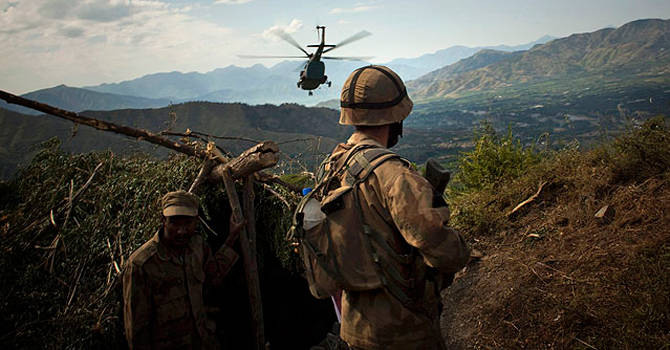ISLAMABAD: The US apology for the Salala attack was once thought to be the easiest of Pakistan’s demands for the Americans to fulfill.
However, it has now emerged as a major hurdle in the negotiations for re-engagement.
Western diplomats put the blame squarely on Islamabad. They claim that serious miscalculations by the Pakistani side in the process leading up to the start of formal talks made the latter miss the bus.
The first round of Pakistan-US talks, which were held in Islamabad last week, ended without any progress because of the American refusal to apologize and their refusal to discuss the demand by the parliament that Washington cease the drone attacks.
By the time the talks ended, President Asif Ali Zardari was pleading with Washington “to help Pakistan in reaching closure on Salala”.
The president was unmistakably referring to the apology, because he himself had on the other sticking point – drones — offered to discuss alternatives. Similarly he had also hinted that broad parameters for resuming Nato supplies through Pakistan had been developed.
The November 26 Salala attack, which forced Islamabad to embark on a parliamentary review of the terms of engagement with Washington, represents a major turning point in the fraught bilateral relationship.
That Washington realized this was evident from their offer at one point to offer an apology for this.
The US delegation had in the meeting between Foreign Minister Hina Rabbani Khar and Secretary of State Hilary Clinton in London conveyed Washington’s readiness to tender apology.
As per the plan, Secretary Clinton was to then make the apology in a statement during her interaction with the media, which was to be followed by US Chairman Joint Chiefs of Staff Gen Martin Dempsey’s call to Army Chief Gen Ashfaq Parvez Kayani Western diplomatic sources revealed that even the Pakistan Army at that stage was ready to accept the offered apology while President Zardari and Finance Minister Hafeez Sheikh were very keen to get the relationship back on track.
However, Dawn has learnt that Pakistan then told the United States to wait till the completion of the parliamentary process.
But this was a serious miscalculation as now the Americans are no longer in the mood. The Pakistanis are being told by Obama administration that it is now too late for an apology.
Some say April 15 Kabul attacks, which brought the Haqqani Network back into the spotlight, have forced a rethink in Washington on the apology.
Those who closely follow the upcoming presidential elections firmly believe that it had more to do with political expediencies. Obama, they say, would not want to look too soft towards Pakistan that is viewed as a difficult ally.
This is why some argue that the decision to not accept the apology when it was being offered was a serious miscalculation on the part of Pakistan.
But it is still not clear who took the decision to ask Washington to wait.
Some unidentified element within the government put the matter on hold. While there is speculation about who this ‘spoiler’ is, some think that it could be the same tough talking member of the Pakistani delegation, who made the defense component of US special envoy to Pakistan and Afghanistan Marc Grossman’s delegation leave the meeting, on the pretext of another pressing engagement.
Those privy to the recent discussions between Marc Grossman and the Pakistani side said Islamabad has been told that the American offer of an apology and more would shrink as time passed and the presidential campaign progressed.
In fact, US diplomats, who are working overtime to explain the Obama administration’s volte face on the apology, are carrying along with them a list of about a dozen and a half occasions when they offered regrets and condolences for the lives lost in the tragic incident.
The US expectations and offers include the start of the negotiations for the resumption of ground supply routes, settlement of outstanding Coalition Support Fund claims, counter-terrorism cooperation, market access for Pakistani exports, financial assistance and cooperation in the Afghan end game.
Foreign Office Spokesman Moazzam Khan was unavailable for comments.
However, it was evident from Foreign Minister Khar’s speech at LUMS the other day that despite the apparent deadlock over the apology Pakistan was keen to move forward.
“Now, as was the case last week with Ambassador Marc Grossman’s visit to Pakistan, we are working with our American friends to establish an ecosystem in which we can both do for each other, the things that we can mutually benefit from. We believe there is a good ending here for both Pakistan and America,” Khar said.















































Dear visitor, the comments section is undergoing an overhaul and will return soon.